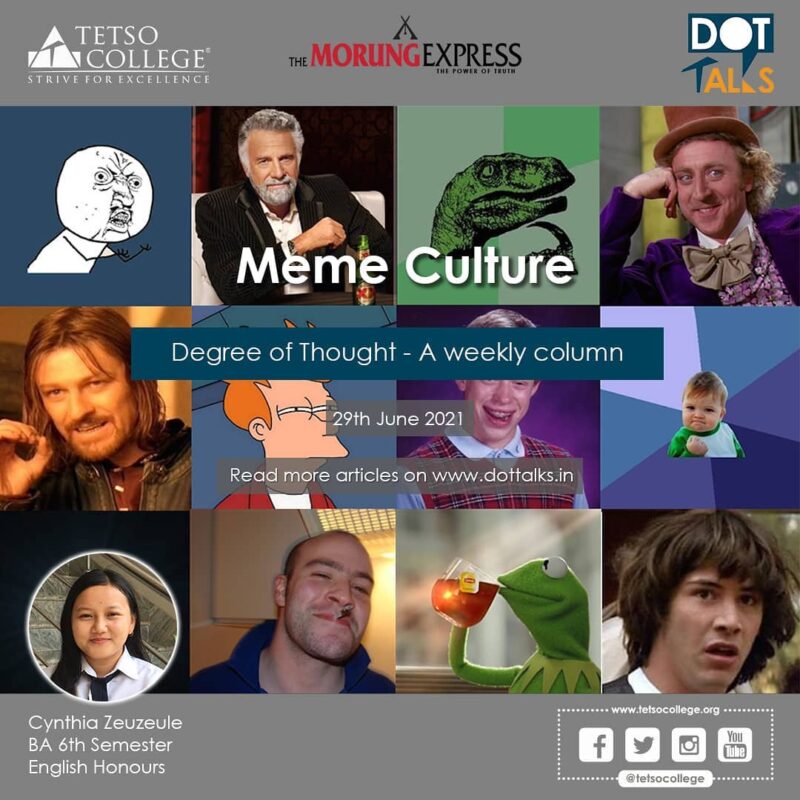 Internet memes use images to celebrate, mock or satirize current events and popular culture, and they have become a defining part of how the modern generation communicates in the digital world. Memes are also used by people to promote certain political ideas or ideologies. They have revolutionized our approach to life using both wit and humour. Cynthia Zeuzeule writes more about this interesting phenomenon in this new age world we live in.
Internet memes use images to celebrate, mock or satirize current events and popular culture, and they have become a defining part of how the modern generation communicates in the digital world. Memes are also used by people to promote certain political ideas or ideologies. They have revolutionized our approach to life using both wit and humour. Cynthia Zeuzeule writes more about this interesting phenomenon in this new age world we live in.
Meme Culture
The Internet is a tremendous platform that is accessible to almost 4 billion users worldwide. It has changed the scenario of global marketing, enabled users to connect with friends and strangers alike and provided an open ground for opinions and information to flow in. With this comes the birth of a subculture that aims to provide laughter in the form of what we know as a meme. A quick background check on its origin takes us to Richard Dawkins who, in 1976, defined it as cultural ideas that spread and repeat themselves across society. The word “meme” is derived from the Greek word “mimema” which means imitation. Today, internet memes are a channel of communication, a satirical tool that gives people the freedom to express their opinions and emotions and is a primary source of information for most netizens.
Memes are created by taking perhaps scenes or lines from movies, images that are quirky or catchy and altering them to suit the message the creator wants to convey. All these are then shared through social media and user generated content websites like Facebook, Instagram and Twitter. Meme content ranges from political satires, awkward situations that most teens might relate to, cringey past memories, fusing over heavy college workload to well over almost anything that’ll tickle the funnybones of millennials and GenZs.
Safe to say, everything has its pros and cons even in the case of something as frivolous as “memes”. Memes address social evils, values and anxieties by acting as an outlet through the use of wit. If seen from this point of view, memes can help bring considerable change or realisation in the least amongst users. A study has found that almost fifty percent of teens suffer from depression and social anxiety. The cause of this is due to the unforeseen future that millennials and GenZs face -climate change, poverty, disease and terrorism to name a few. Here is when memes act as a sort of “safe haven” for them who, by accepting the “absurdities of the time” make memes out of it.
A cloud of gloom overshadowed the American soil in May 2020 after the death of George Floyd. In the wake of such tragedy and injustice, users took to social media to spread useful information about racism and white privilege. Those unable to physically participate in #BlackLivesMatter protests start sharing memes about police brutality. The internet was flooded with millions supporting the movement. The ability to reach millions within minutes shows how memes have brought a revolutionary cultural change.
Memes have also been used for political activism. Take China for example where the media is heavily censored. A meme comparing Chinese President Xi Jinping to Winnie the Pooh appeared online and Chinese netizens were more than amused to make it go viral that the government ended up banning the character’s appearance from China’s cyberspace. Here, we see that memes are used as a way to subtly rebel against their governments.
However, memes can have a dark side to it too. Considering the nature of memes and how quickly they can become viral, if memes contain wrong information, then it’ll prove harmful as memes tend to assimilate quickly into the minds of the netizens and some viewers might just end up believing whatever they see on the web without fact checking it.
The rise to power of memes is undeniable whether it may be in terms of bridging cultural differences or revolutionizing our way of communication. Memes act as a commentary on society allowing users to pour out their views in a variety of ways. At the end of the day, memes are simply funny, stupid and just so relatable that is hard not to laugh when you see one.
Degree of Thought is a weekly community column initiated by Tetso College in partnership with The Morung Express. Degree of Thought will delve into the social, cultural, political and educational issues around us. The views expressed here do not reflect the opinion of the institution. Tetso College is a NAAC Accredited UGC recognised Commerce and Arts College. The editors are Dr Hewasa Lorin, Dr. Aniruddha Babar, Aienla A, Rinsit B Sareo, Meren Lemtur and Kvulo Lorin.
For feedback or comments please email: dot@tetsocollege.org

